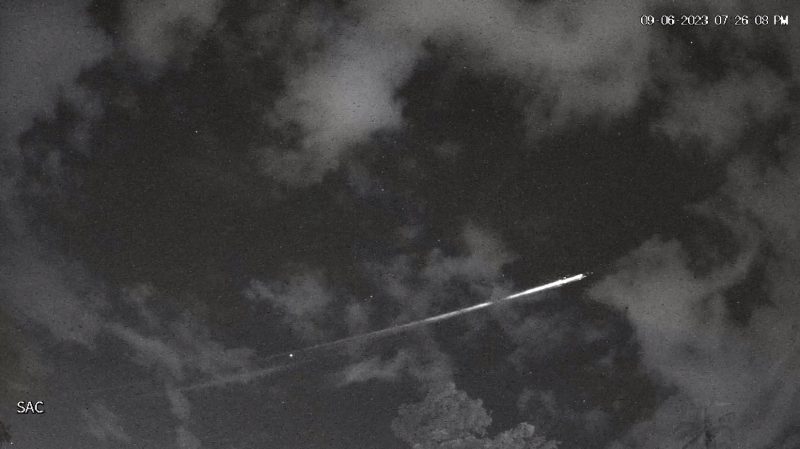Watch this video, which shows three different angles as a Starlink satellite disintegrates near Puerto Rico.
Starlink satellite disintegrates over the Caribbean
Witnesses in Puerto Rico and the Dominican Republic saw a spectacular satellite reentry around 7:25 p.m. local time (23:25 UTC) on September 6, 2023. Observers reported the reentry appeared across the sky from horizon to horizon, blazing a path from southwest to northeast. According to reentry predictions, the object was Starlink-30167, a satellite from SpaceX’s Starlink constellation, launched on July 28, 2023. Although the new Starlinks are called “V2 mini”, when the solar panels are deployed each spacecraft is 100 feet (30 m) wide.
The Starlink-30167 was part of a group of 22 internet satellites launched on a Falcon 9 rocket from Florida’s Cape Canaveral Space Force Station. However, this particular satellite failed to reach its intended orbit. It gradually lost altitude and eventually reentered Earth’s atmosphere.

How to tell a meteor from space debris
Although some observers may think at first they are seeing a meteor, there are two main characteristics that will let you know if it’s space debris.
- Space debris appears as an extremely slow “meteor”, sometimes lasting one or two minutes. A natural meteor (space rock) takes just a few seconds to zip across the sky. In fact, space debris appears so slow that some people are able to turn on their phone’s cameras to take pictures or video of the event.
- Another clear indication that the observed object is space debris in our atmosphere is that it will have a very noticeable fragmentation. You’ll be able to see some small objects separating from the main object, with some leading the main event while other fragments fall behind.
This is not the first time observers have seen Starlink satellites disintegrating in our skies. On February 7, 2022, a group of just-launched satellites reentered the atmosphere when a geomagnetic storm from the sun prevented the satellites from reaching their intended orbit. Geomagnetic storms cause the atmosphere to warm and affect atmospheric density, increasing drag and causing low-altitude satellites to reenter.
Bottom line: Watch as a Starlink satellite disintegrates on video over the Caribbean on September 6, 2023. See 3 angles of the satellite burning up here.
The post Starlink satellite disintegrates over the Caribbean first appeared on EarthSky.
0 Commentaires